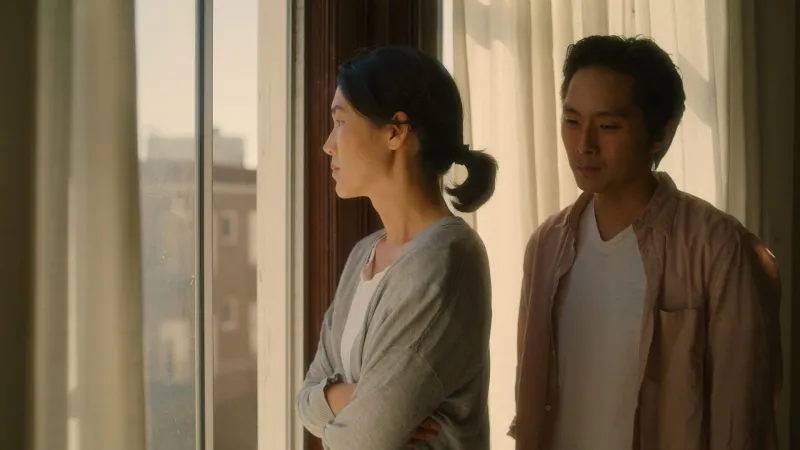Based on a short story with the same name by Stanford’s Professor Chang-rae Lee, the quiet beauty of Wayne Wang’s new film “Coming Home Again” (written by Wang and Lee) captures the relationship of a Korean American son’s loss for words as his mother is dying from stomach cancer. While putting its short-story roots on display in a non-linear fashion, Wang carefully inserts flashbacks that are stylistically inseparable from present-day — save for the identifier that Chang-rae’s mother is smiling and not bed-ridden. In doing so, Wang weaves a complex tale of grief, loss and accumulated emotional stagnancy primarily situated within one home.
The film opens with a release of Chang-rae’s pent-up emotions — he bursts into sobs after running up a steep hill characteristic of San Francisco, establishing the locale as well as the story to come. Masterfully played by actor/director Justin Chon (“Gook,” “Ms. Purple” and the upcoming “Blue Bayou”), Chang-rae is otherwise stoic, caring for his mother (Jackie Chung) out of love and as a dutiful son — but he does not openly recognize the former. Most of the film is concerned with the relationship between Chang-rae and his mother — his mother’s kalbi/galbi (Korean short ribs) are foundational to their connection. “Food as memory” or “food as connection” is a common trope in contemporary Asian American film — yet “Coming Home Again” subverts this trope by dwelling much less on the sensory experience of the food and what it evokes, instead focusing on the experience of creating the food and the cooking lessons Chang-rae’s mother passed onto him. Chang-rae’s feeling of ineptitude, being “not good enough” for his mother, is perfectly exemplified through his fear of not being able to make kalbi, a food she gave him as a post-school snack, just as she taught him. In one particularly jarring scene, Chang-rae’s mother forces out a smile while frantically choking on Chang-rae’s kalbi and spitting it out. Neither Chang-rae nor the viewer can parse out whether it is due to Chang-rae’s cooking skills or due to his mother’s stomach cancer, and Chang-rae’s mother is notably tight-lipped, merely affirming that the kalbi is, in fact, tasty and neither confirming nor denying the cause.
While “Coming Home Again” is not as distinctly linear as popular American audiences might expect (or even hope for), it epitomizes the static nature of their relationship: his mother questioning why he has returned home and denying any assistance while Chang-rae attempts to make himself useful while floundering, having stepped away from his fancy Wall Street job. The element of religion in “Coming Home Again” is rather understated but becomes one of the most interesting parts of the film. In an uncomfortable scene between Chang-rae, Chang-rae’s mother and what appears to be her church friends, Chang-rae refuses to take his mother’s stomach cancer as simply “God’s will” as they solemnly sing “Auld Lang Syne” in Korean. But this denial is more revealing of the protagonist than it is of them: clearly not ready to let go of his mother, but at the same time the nature of their relationship had not established an open precedent to really say what he feels.
Chang-rae’s sister (Christina July Kim), however, can and will. Between Chang-rae’s father (John Lie) — who Chang-rae accuses of having an affair with a younger woman — Chang-rae and his sister, it’s his sister who openly objects to putting their mother in hospice and simply letting life take its course. The entrance of his sister in the latter half of the film breaks the stillness of the film, inserting an element of freeness that is clearly not the norm around Chang-rae and his mother, who are guided by a lack of communication and demonstration of their love through actions like making food for each other. His sister also slips in another subtle, revealing element of the film: she calls him Rae rather than Chang-rae, an aspect of assimilation — and perhaps also recognizing the name his mother gave him — on which Chang-rae pushes back when he tells his childhood friend to call him Chang-rae, not just Rae.
The film prefers to rely on the slow pace and subdued mood it establishes from the start, which will certainly please some viewers and frustrate others. While the film does capture solemnity well, it loses steam when it’s stuck in this narrative box in its 86-minute runtime which, in and of itself, is plenty of time to explore the portrait of a relationship. Although the film is dominated by quiet moments of reflection and the occasional outburst in private, it reveals its secrets in the juxtaposition between restraint and emotion. Moreover, the film is dominated by long stretches of mundane shots that the viewer must interpret for themselves. Chang-rae does, in fact, reach his breaking point in the “Coming Home Again,” and it’s a stunning moment of catharsis for both Chang-rae and the viewer, demonstrating the efficacy of such hard-won moments in Wang’s measured filmmaking style.
“Coming Home Again” is absolutely a film to add to the contemporary Asian American canon, if you support or acknowledge that one exists (or should exist) as an entity. It’s a film that pristinely captures the impossibility of open, verbal communication between many Asian American children and their parents, especially in times of grief when it’s truly needed the most. You can watch “Coming Home Again” online now through Virtual Cinema and at select in-person theaters.
Contact Olivia Popp at oliviapopp ‘at’ stanford.edu.
